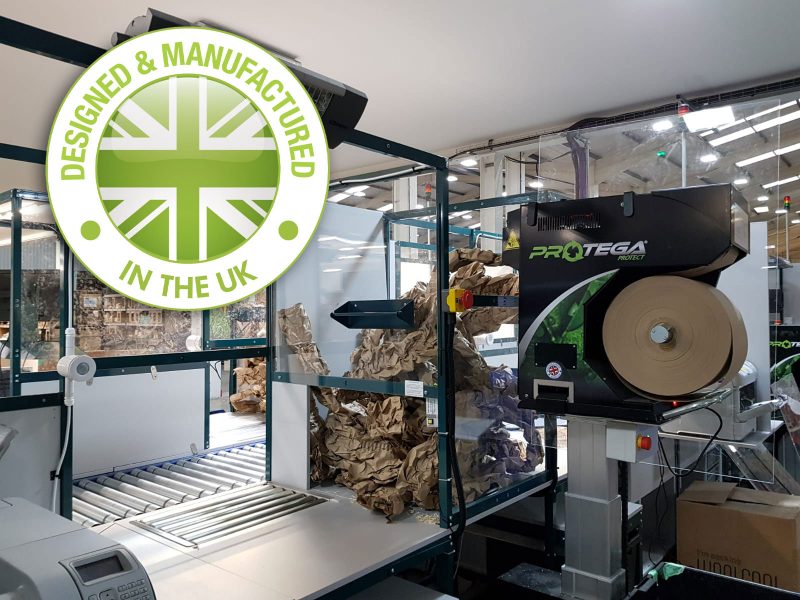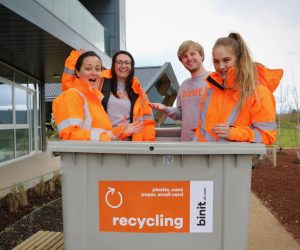

TURN A NEW PAGE WITH PROTEGA GLOBAL’S PACKAGING
Businesses planning warehouse operations for the forthcoming festive season can be massively challenging as we know. Packaging is one of the most space intensive requirements and this, along with staff shortages, social distancing and fewer HGV drivers on the road, are a direct threat to productivity.
Then there’s the seismic shift to online orders because of the Covid-19 pandemic and space constraints at peak periods likely resulting in slower packing times and delays in despatching. All of this combined could result in unhappy customers and really damage growing businesses.
But there is a solution. Enter packing solutions expert Protega Global Ltd. It has developed the Hexcel Dispenser Bench to complement its paper alternative to plastic bubble wrap. It’s a packaging innovation that can enhance operator efficiency, productivity and sustainability in all warehousing and packing areas.
New packaging solutions eBook available now
Companies are becoming increasingly aware of the need for sustainability to be reflected in the packaging they use so it ticks a huge box there too. Sustainable packaging shows customers they are taking corporate social responsibility seriously, plus it enhances brand image, encourages returning customers, minimises carbon footprint, lowers shipping costs and reduces waste.
There are viable, cost-effective alternatives to non-sustainable packaging. From space-saving solutions to help streamline operations in packing areas already under pressure, to sourcing smarter and faster ways to pack goods, and eco-friendly packaging to satisfy consumers.
For example, 100% biodegradable and recyclable solutions, for speeding up a taping process, including no tape at all! Or a combination of Protega’s Hexcel equipment and stackable material on a packing bench that can save time and improve production, saving operators having to access large rolls of bubble wrap stored elsewhere on the floor. It’s also very flexible for different applications because it can spiral wrap wider products without the need for adhesive tape.
Protega Director Richard Steedman says: “From direct experience we know that packing areas can become very busy very quickly, and when this happens space can become the number one problem. A messy environment can quickly become unproductive if there is a lack of room to move, and obstructions can easily cause health hazards, breakages and reduced staff morale.
“We have condensed all our knowledge and experience into one useful online tool that will help with productivity and sustainability in any warehouse or packaging business. Our customers can literally turn a new page with our eBook!”
Get your free copy here https://protega-global.com/e-book-registration-form/
COMMEMT BY DANIEL WILLOCK:
“The recent IPCC report has shown us that climate change is having disastrous effects across the globe, disrupting natural systems, raising sea-levels, forest fires and more. To combat climate change, governmental action and environmental laws have been implemented in several countries.
However, despite these efforts, the target of reaching net-zero by 2050 and halving greenhouse gas emissions by 2030 is still out of sight according to UK-based data analytics company GlobalData.
The good news is that the IPCC report still believes there is time to do something about this – if we act fast. Whilst all eyes are on governments, we all of course have a responsibility to reduce carbon emissions in all our personal and business activities.
The question is, how does the plastic packaging industry contribute to climate change? The plastic industry is well known for the damaging effects it has on the environment.
Plastic pollution threatens wildlife and spreads toxins; we are all familiar with the images of animals wrapped in plastic bags, or birds trying to feed their young on plastic particles. But what contribution is plastic production making to carbon emissions and climate change?
According to UK-based environmental organisation Friends of the Earth, the manufacturing process of plastic is responsible for 5% of greenhouse gas emissions.
The extraction process of fossil fuels releases dangerous greenhouse gases and is known to be the largest contributor to climate change. Plastic relies on these fossil fuels and contributes to the overall demand for oil.
According to the IPCC report we could be facing a troubling future if the intensive use of fossil fuels continues, as you can see by the graph below. Switching to sustainable packaging can help reduce the use of fossil fuels and contribute to the ‘Future based on sustainability’ line demonstrated on the graph.
Protega Global can provide low carbon footprint packaging, when it comes to paper, studies show it’s the most sustainable option when it comes to packaging; it does not rely on the extraction of oil, is widely recycled and is truly biodegradable. At Protega we also use 100% paper recycled products wherever possible, which has a lower carbon footprint than virgin paper.
We at Protega Global have a strong sustainable ethos and continually innovates to bring the best paper protection products to the market. Any businesses considering switching from plastic void fill packaging can do so with confidence with Protega. With our compact and efficient systems, we can help make your switch cost neutral whilst improving pack speeds and increasing protection.
Following this weeks IPCC report, no doubt the majority of businesses will be doubling down on reducing its carbon footprint. If you are one of them, whether you are currently using plastic packaging or potentially over-packing with ineffective paper, Protega Global can help you. We are offering live demonstrations to showcase our industry leading paper packaging & integration services and showing packing techniques that are guaranteed to reduce your usage and result in a lower carbon footprint.”
“There are four ways Protega Global help provide low carbon footprint sustainable packaging:
1. Our Paper
All of our paper is produced in the UK from sustainably managed sources and made from 100% recycled paper. This gives customers the confidence that our products are truly sustainable and allowing them to provide low carbon footprint packaging to consumers.
2. Our Machines/Benches
As part of our goal to provide low carbon footprint products, all machines and machine parts are sourced in the UK. Along with our packing benches being produced and manufactured in our Salisbury facility, cutting out the heavy footprint that comes with sourcing parts from overseas.
3. Our Distribution
One of the many benefits that comes with our Cushioning Paper is that 32 rolls, or 9600 metres of it can fit on one pallet. This is thanks to it’s unique pre-folded design, which means it is more compact, stable and easier to handle. This is a great saver on carbon footprint, with the ability to make fewer deliveries when distributing.
4. Cushion Integrity
The strength and cushion integrity of our Protega Paper allows packers to reduce their usage by up to 50%. The void fill solution is both robust and easily mouldable. Because of the way the Protega paper is creased and crimped it secures and cushions your products, absorbing shock and eliminating movement in transit. Reducing your packaging use is a simple way to lower your carbon footprint, you can also read our blog on using paper packaging correctly.”
To watch a short video on why you should choose sustainable packaging solutions click HERE.
You can find out more by visiting www.protega-global.com or calling us on 01722 427842





